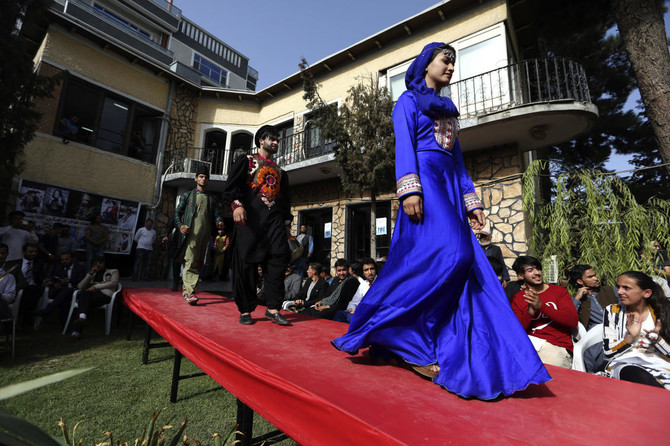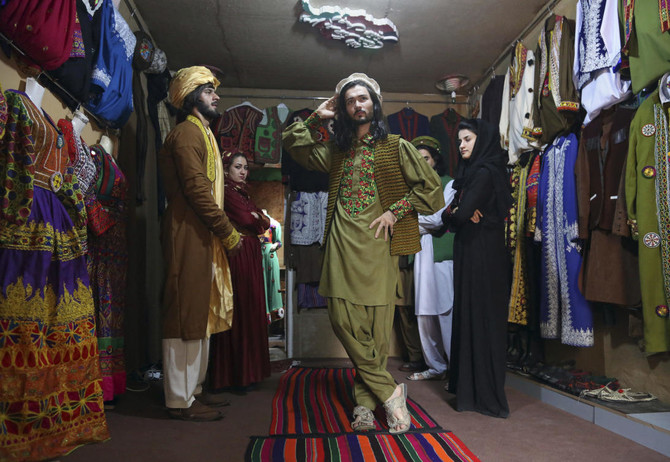KABUL: Amid tight security, over two dozen young models, including six women, strutted down the catwalk in the garden of a private Kabul villa, proudly displaying the traditional clothing and costumes of Afghanistan’s many ethnic groups.
The audience, about 100 men and women, tightly packed the small space on a recent afternoon, but the mood was as bright as the models’ embroidered tunics and scarves — a scene that would have been unimaginable under Taliban rule.
For the organizer, 22-year-old model and fashion designer Ajmal Haqiqi, putting on the show was worth the risk — despite daily threats of militant attacks in this war-weary capital.
Haqiqi says he was motivated by the desire to show off Afghan culture through the nation’s dazzling abundance of traditional garments and regional costumes. If Afghans regain an awareness of their rich heritage, this could help unite them, he said.
“I told myself, if a suicide bomber attacks us, even if I lose my hands and feet, I will continue on the way that I have chosen,” an exuberant Haqiqi told The Associated Press after the event.
Kabul has seen few fashion shows over the past years, mostly catering to international audiences. Haqiqi’s show was the first all-Afghan enterprise: Afghan models showing Afghan traditional clothing to an all-Afghan audience.
However, the idea of women on display remains mostly taboo in Afghanistan, more than 16 years after the 2001 US assault that ousted the Taliban from power after a repressive five-year reign.
Some women still don’t go outside without wearing blue burqas that cover them from head to toe, leaving only mesh over the eyes. Violence against women is still common, and there are reports of women being stoned, executed in public or imprisoned for having affairs with men. Women have even set themselves on fire to escape domestic violence.
Haqiqi’s group, the Haqiqi Modeling Agency, is a relative newcomer on the country’s small fashion scene but he has appeared on national television on various occasions, such as Independence Day, the Persian New Year, known as Nowruz, and the Muslim holidays of Eid Al-Adha and Eid Al-Fitr.
The agency sells the designs under its own “Haqiqi Brand,” with about 70 percent of the sales going to foreigners and Afghans living aboard.
Atefa Fasihi, 21, joined Haqiqi’s team two years ago and the show was her debut before a live audience. She acknowledged feeling uneasy as heavily armed security guards protected the villa in a western Kabul neighborhood.
“Everybody is scared, but ... we are working to promote our Afghan culture, so I foresee a good future,” Fasihi said.
Husna Sadat, who was in the audience, said the prospect of more such shows is exciting. “If we can change the mentality of our people from all these years of fighting, then I am sure the people can be ready for a better future,” she said.
Kabul has been battered by attacks over recent months, most claimed by the Taliban but some also by an Islamic State affiliate.
Last month, a Taliban suicide bomber rammed his car packed with explosives into a bus carrying government employees in the same western Kabul neighborhood where Haqiqi’s show took place, an area that is home to several private schools and where many politicians reside. The rush hour attack killed 24 people and wounded 42 others.
And on May 31, the city saw its worst suicide bombing since the Taliban collapse — an attack that killed 150 people and wounded scores.
But it was all smiles at the fashion show.
The male models showed off Afghan variants of the shalwar kameez, the men’s long shirt and pants also known as perahan tunban, with turban, pakul or karakul hats. The women wore colorful gand-e-Afghanis, made from softly flowing and intricately embroidered materials, some with matching scarves.
For Amina Sherzad, also in the audience at Haqiqi’s show last week, the mix of the ethnic garments held a message of acceptance.
“It shows that we can accept each other, a model can be a Tajik or a Hazara but can wear the other’s ethnic clothing,” she said, referring to two prominent ethnic minorities. “We are the same.”
Kabul catwalk: Afghan models show off traditional clothing
Kabul catwalk: Afghan models show off traditional clothing

Jacquemus unveils new campaign shot in Egypt

DUBAI: French fashion house Jacquemus on Wednesday unveiled its latest campaign, “La croisière,” set entirely in Egypt and captured over a 24-hour journey from Cairo to Aswan.
The campaign, shot by Egyptian photographer and director Mohamed Sherif, starred Brazilian-New Zealand model Angelina Kendall and Egyptian model Mohamed Hassan, and merged high fashion with Egypt’s historic and natural landscapes.
It features striking visuals in front of the Great Pyramid of Giza, along the Nile River, on a wooden riverside deck, and in lush farmlands surrounded by palm trees.
In the pictures and videos, Kendall was seen wearing pieces from Jacquemus’ collection, including a voluminous polka-dotted coat with exaggerated sleeves and a long train, a bold red dress, and a sculptural banana-printed two-piece ensemble, among other looks.
Meanwhile, Hassan wore an off-white suit with a relaxed fit, a yellow-and-white striped shirt tucked into wide-leg black trousers, and an all-black ensemble featuring an open-collar shirt and high-waisted trousers.
Accompanying the still images, a series of short videos that captured the journey, showcasing the scenery from Cairo to Aswan, were released on social media.
Dyson expands footprint in Saudi Arabia due to ‘increasing demand for technology’

DUBAI: Alongside a roster of new product launches, technology company Dyson is expanding in Saudi Arabia due to an “increasing demand for high-performance technology,” a spokesperson told Arab News.
In the haircare field, the recent launches of the Dyson Supersonic r™ hair dryer — smaller, lighter and more maneuverable than the original Supersonic™ hair dryer — and its limited-edition haircare colorways have made headlines in the international beauty industry. And when it comes to Saudi Arabia, the most recent opening in Jeddah’s Red Sea Mall is part of a planned slate of stores in the country with another set to open this summer.
“With Saudi’s Vision 2030 there is an increased investment in technology, retail, and infrastructure, so now is the ideal time to deepen Dyson’s presence and make our advanced engineering solutions more accessible to consumers,” the representative said, before noting the “appetite for cutting-edge solutions in the Kingdom.”
According to Dyson, customers at the brand’s stores in Riyadh, Dammam and Jeddah are looking for high performance technologies that tackle problems like air pollution and dust. Floorcare and environmental care products also resonate with customers given the environment in the region, particularly the HEPA air purifiers, according to the brand.
When it comes to hair styling, heat damage, stickiness, brittleness and crunch are issues customers are most keen to tackle, with the “Dyson Airwrap™ i.d. multi-styler and dryer quickly becoming a fan favorite for styling.”
The interest in haircare is something Dyson has taken note of in the Kingdom, with the latest store in Jeddah featuring two private styling stations and a wash basin for veiled buyers who wish to try products including the Supersonic Nural™ hair dryer, the Dyson Airstrait™ and Dyson Corrale™ cord-free straightener, among others.
“We offer personalized styling sessions at Dyson Demo Stores, where (customers) can learn how to maximize the performance of our products,” a Dyson representative explained.
Fashioning identity: Saudi designer champions tour guides as ambassadors

- Dallal Al-Juhani’s uniform concept weaves together tradition, technology
- We should showcase Saudi heritage to the world through tourism and fashion, she says
JEDDAH: In Saudi Arabia, where each region’s distinct heritage shines through its landscape and traditions, tour guides serve as vital ambassadors — and one Saudi designer believes their attire is key to embodying the cultural treasures they represent.
Dallal Al-Juhani, a fashion design faculty member at Taibah University, has developed a visionary concept for tour guide uniforms in AlUla which blends heritage with modern style.
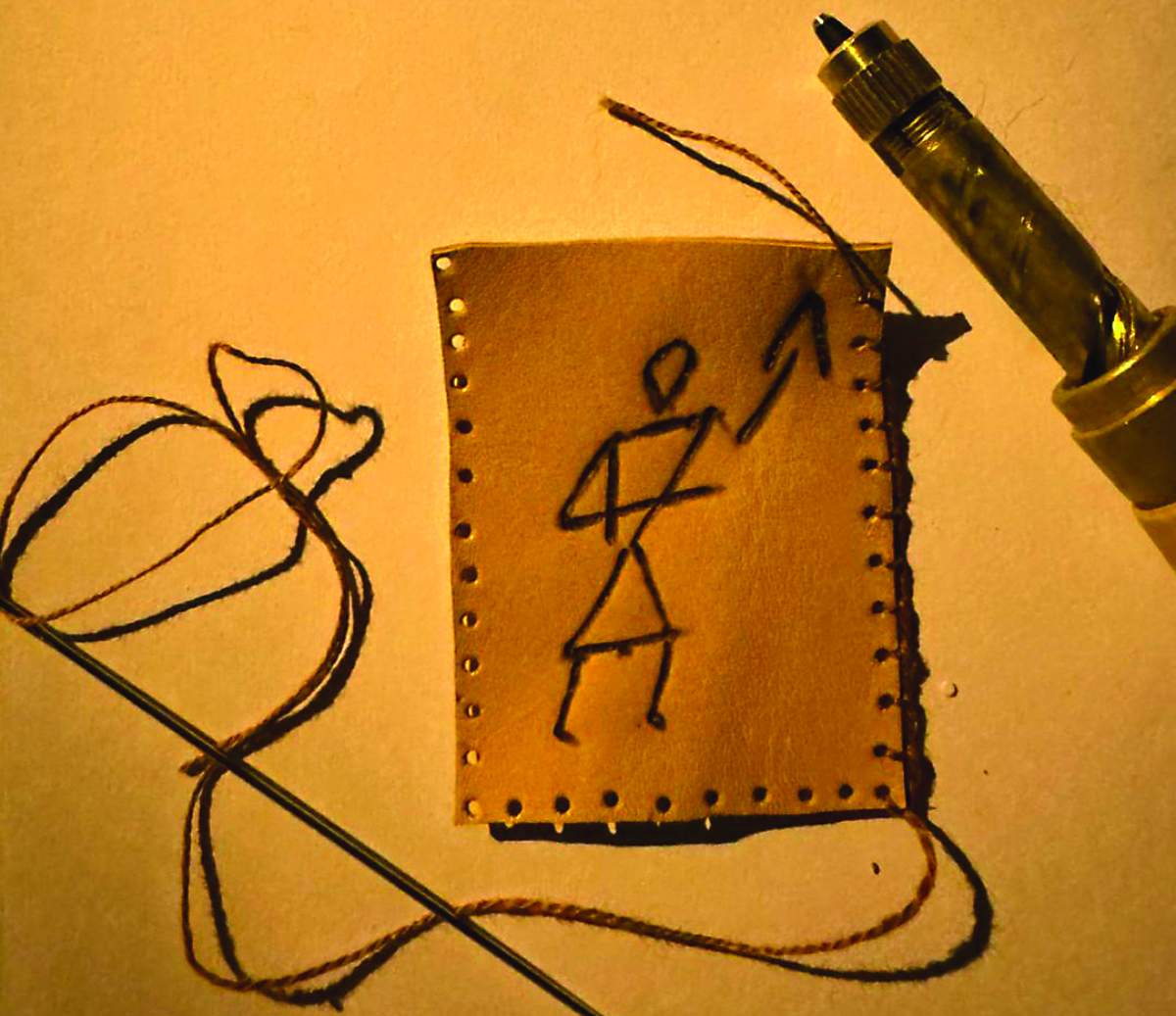
Using technology to champion heritage, her project merges the cultural identity of AlUla with aesthetics and the functional needs of the job, highlighting Saudi identity in its finest form.
“Saudi heritage has its place and value,” she told Arab News. “We should be proud of it and showcase it to the world through the tourism and fashion sectors."
HIGHLIGHT
Dallal Al-Juhani, a fashion design faculty member at Taibah University, has developed a visionary concept for tour guide uniforms in AlUla which blends heritage with modern style.
Al-Juhani holds a bachelor’s degree in clothing and jewelry design from Taibah University, and boasts a master’s in fashion design from King Abdulaziz University.
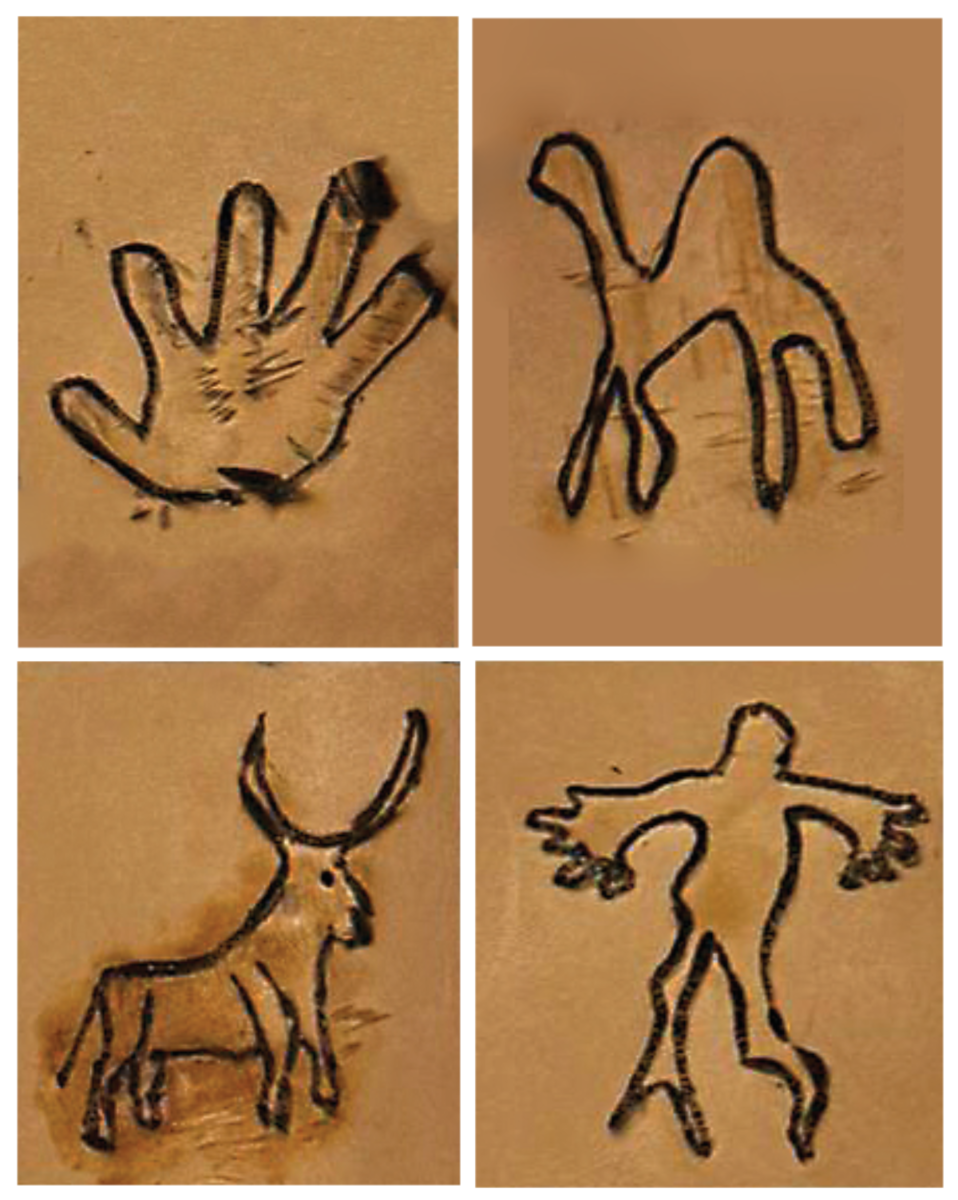
She added: “During my studies there was a significant focus on fashion that reflects heritage, as well as the role of modern technologies in the development of the fashion industry.”
Reflecting on the inspiration behind her vision for tour guide uniforms, she said: “During my visit to AlUla in 2021 I noticed that tour guides did not have a specific uniform to stand out to visitors.
Saudi heritage has its place and value. We should be proud of it and showcase it to the world through the tourism and fashion sectors.
Dallal Al-Juhani, Saudi designer and academic
“As a fashion designer I felt compelled to find a solution to this issue by creating designs suitable for this role.”
Al-Juhani’s uniform concept reflects the rich identity of AlUla through colors, patterns, materials, and techniques, all inspired by the region’s heritage.

It serves as a visual narrative, representing the beauty of AlUla’s monuments while establishing a deep connection between the storyteller and the place itself.
She said: “Patterns were inspired from iconic locations such as Al-Hijr and Jabal Ikmah, incorporating Nabataean letters and prominent symbols such as the bull, lion, and hand.”
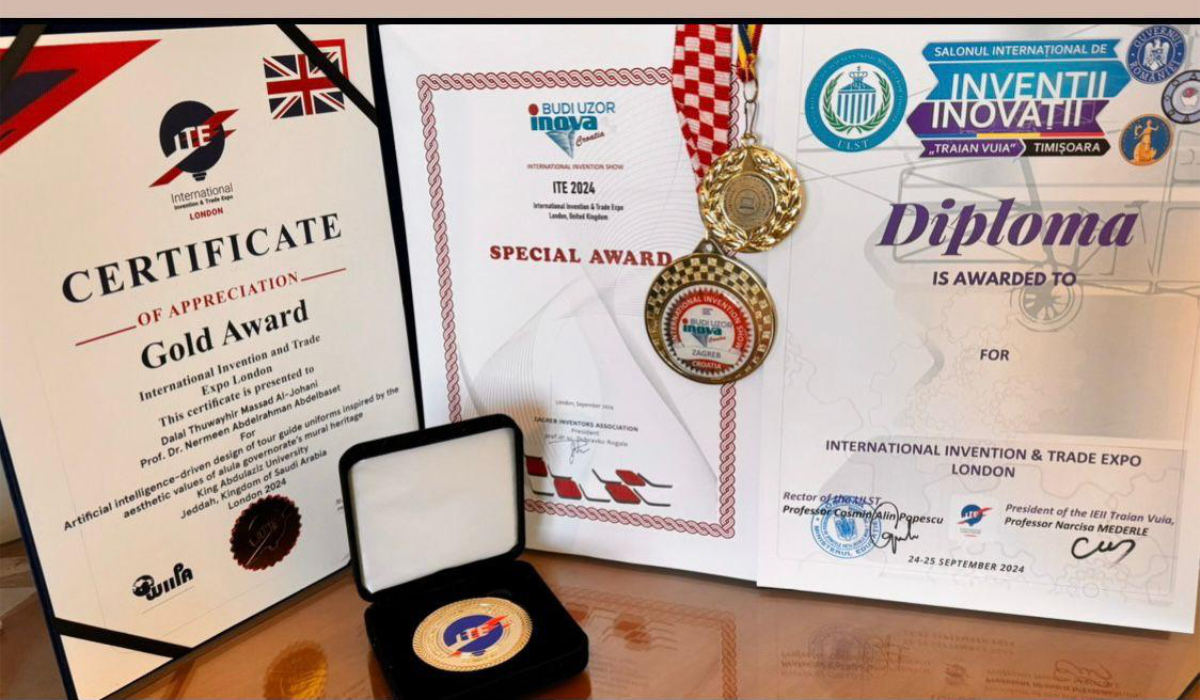
Functionality was a key consideration in the uniform’s design, and Al-Juhani added: “The uniform gives the tour guide a sense of belonging and comfort, leaving a positive impression on tourists, which elevates the level of professionalism in the tourism sector.”
As a young Saudi designer Al-Juhani’s message to her peers is to keep up with modern trends by utilizing new technologies in design and illustration. In fact, as part of her project, she harnessed artificial intelligence techniques to enhance her designs.
And to bring her vision to life she used AI-powered tools like Midjourney and Lexica to develop prototypes before transitioning to manual work.
She said: “I used natural leather and techniques such as burning and decoration that mimic the ancient Nabataean style. I also added traditional details using leather threads and blanket stitching to enhance the heritage touch.”
While Al-Juhani did face some challenges in sourcing high-quality materials, the input offered by tour guides made the process smoother.
She added: “I made sure to involve them in every stage to strengthen their connection to the uniform, making it a project they felt a part of rather than just a product.”
Her innovative approach has already earned her recognition, and Al-Juhani was awarded the gold medal at the London International Exhibition of Inventions and Innovations in 2024, as well as receiving special recognition from Croatia and Romania at the same event.
“It was proof that heritage and monuments give design authenticity, uniqueness, and enhance its aesthetic and expressive value,” she said.
France’s IMA launches Arab Fashion Award

- Award will celebrate ‘enormous creativity’ of Arab designers says IMA’s Philippe Castro
PARIS: The Institut du Monde Arabe in Paris has announced the launch of its Arab Fashion Award — the AFA-IMA — to promote and celebrate the rising stars of the Arab world’s fashion scene.
Since its opening in 1980, the IMA has supported Arab creativity in all its forms, including fashion. It has hosted numerous shows and exhibitions highlighting the role fashion plays at the intersection of cultures.
Philippe Castro, chief of staff of the presidency of the IMA, and the man behind the new initiative tells Arab News that “the moment seems ripe” for the launch of the award.

“We’re seeing Fashion Weeks popping up in Riyadh, Dubai, Beirut and Marrakesh. We’re seeing enormous creativity in fashion design in the (Arab) region as a whole and there is a growing appetite for these designers. They deserve our attention,” Castro says. “Christian Dior once said, ‘The air of Paris is the very air of haute couture.’ The same can be said today of the air of Riyadh, Beirut, Egypt, Morrocco and Tunisia. All these places have a long tradition of couture. Take Tunisia, for instance; it’s no coincidence that master couturier Azzedine Alaïa came from Tunisia.”
If Paris is the world capital of fashion, that is thanks in no small measure to Castro’s longtime colleague Jack Lang, president of the IMA. As Minister of Culture, it was Lang who saw the potential for fashion to become a booming industry for France. In 1982, he succeeded — in the face of a lot of pearl-clutching — in making the Cour Carrée of the Louvre and the Tuileries Gardens the principle venues of Paris’ runway shows, moving fashion front and center in public consiousness. The number of fashion shows in Paris doubled between 1980 and 1990, after which fashion was definitively established as a sector that means serious business.
“Jack Lang made fashion fashionable.” Castro says. “We’re very lucky to have him as our president. He gave an unprecedented impetus to young fashion designers in the 1980s. Having worked alongside him for many years, as a big advocate of fashion, this award seems natural and inevitable.”

Castro is a regular visitor to Saudi Arabia, where, he says, he has witnessed “an incredible evolution in fashion” over the past decade, especially in Riyadh and Jeddah.
“There is a tangible effervescence and dynamism visible with people on the streets. On my most recent visit to Riyadh, I visited concept stores selling abayas. I find the reinterpretation of the abaya and the thaub brilliantly creative,” he says. “The designers have limitless imagination; they know how to explore their own culture creatively. I was also fascinated to see superb Saudi-designed streetwear for the first time. I fell for a towelling beach robe with pockets and a hood inspired by traditional Saudi robes — pure creative genius!”
Navigating the international fashion world is a complex challenge for young international designers. Creative talent is not enough, they need experienced professional mentoring. So the IMA is partnering with the world-renowned Institut Français de la Mode (the French Fashion Institute) to help the award winners develop their professional skills in cutting, patternmaking and marketing as part of the prize.

This first edition of the AFA-IMA is deliberately fluid. Jewellery and accessory designs are also eligible for entry. The award has two categories; Emerging Talent and Innovative Talent, with an option for the jury to grant a third award to an established Arab designer. Other categories may be added as momentum grows.
“It will evolve according to the type of entries we receive and be adapted accordingly,” says Castro. “This is an haute-couture — not ready-to-wear — process.”
The award is open to designers who are nationals of Arab League countries or part of their diasporas. The jury consists of key figures from fashion, art and culture including Pascal Morand, executive president of the Fédération de la Haute Couture et de la Mode; Pascale Mussard, the founder of Hermès’ upcycled luxury brand Petit h; Lebanese fashion designers Rabih Kayrouz and Milia Maroun; Elsa Janssen, director of the Yves Saint Laurent Museum in Paris; and Manuel Arnaut, editor of Vogue Arabia.
“We composed our jury of people at the pinnacle of their profession. We always aim for excellence,” says Castro. “The members will follow the prize-winners’ progress closely. This is not a one-off. It’s a long-term initiative to showcase the region’s enormous creativity.
“We composed the jury of good friends of the IMA — a friendly needle and thread which will make dazzling embroidery. It’s a project that comes from the heart, because fashion is all about emotion. If there is no heart, there is no point,” he continues. “We are living in an era of severity, if we can diffuse some beauty into the world, so much the better for us all.”
If you need to know the price ... you can’t afford it

- Rare blue diamond valued at $20m goes on display in Abu Dhabi before auction next month
- The blue diamond will also be showcased in Taipei, Hong Kong and New York before its exhibition and sale in Geneva in mid-May
ABU DHABI: A rare blue diamond valued at $20 million went on pre-auction display on Tuesday in Abu Dhabi.
The 10-carat Mediterranean Blue, which will go on sale in Geneva next month, is the showpiece of a collection estimated at $100 million.
“Included in the group are the largest flawless diamond in the world ... the second-largest red diamond known to exist and several diamonds over 100 carats,” Sotheby’s auction house said.
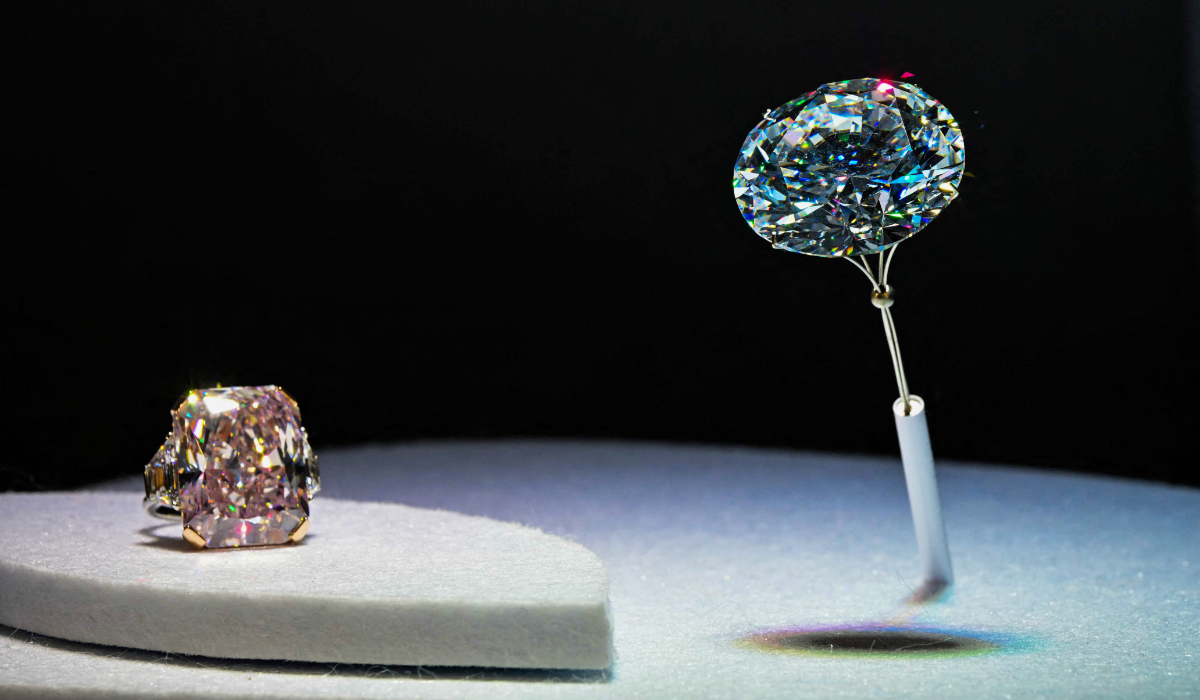
The polished stones were on display in Abu Dhabi’s Saadiyat Island cultural district on Tuesday next to lavish jewelry, including a white-diamond encrusted necklace featuring a 100.26-carat pear-shaped brown diamond pendant.
The blue diamond will also be showcased in Taipei, Hong Kong and New York before its exhibition and sale in Geneva in mid-May.
“At the top of the rarity pyramid are blue diamonds,” said Quig Bruning, head of jewels for Sotheby’s in North America, Europe and the Middle East.
“Diamonds of exceptional color and size are by definition wonders of nature that seldom occur, so their presence at auctions can only be infrequent.
“Such diamonds were rarer than usual on the market in the past year or so, which makes the sale of the Mediterranean Blue an even more exciting event.”


